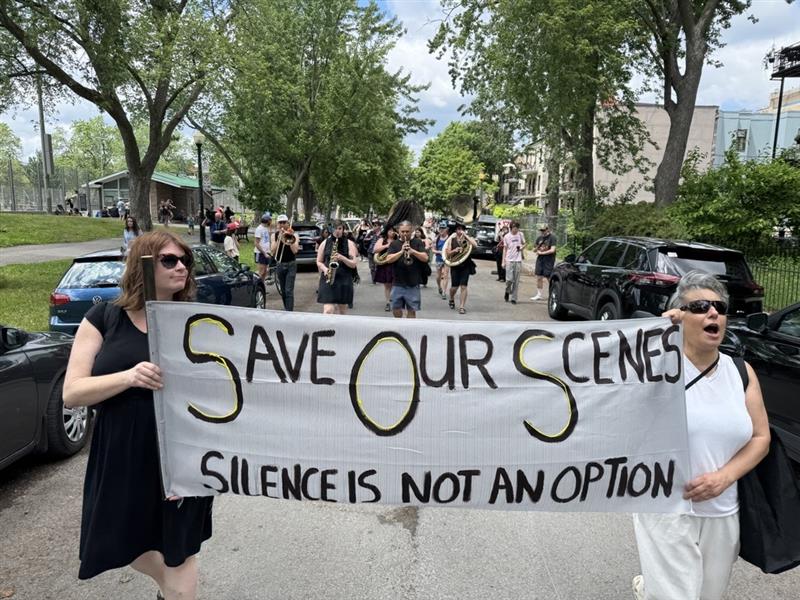The haunting melodies of a funeral march echoed through downtown Montreal yesterday as hundreds of artists, musicians, and cultural workers dressed in black processed solemnly past the shuttered facades of once-vibrant venues. This wasn’t a traditional memorial service, but rather a powerful artistic protest against what participants are calling a cultural extinction in the city.
Montreal, long celebrated as a creative powerhouse, has seen over twenty cultural spaces permanently close their doors in the past eighteen months. The latest casualties include Le Ministère on Saint-Laurent Boulevard, Café Cléopâtre in the Quartier des Spectacles, and Théâtre Sainte-Catherine – all victims of skyrocketing rents, reduced post-pandemic audiences, and what many describe as insufficient government support.
“Each venue that closes represents hundreds of lost opportunities for emerging artists,” explained Marianne Duval, a performance artist and co-organizer of the protest. “These aren’t just businesses – they’re incubators where artistic voices develop and find their audiences. We’re watching our cultural ecosystem collapse in real time.”
The “Funeral for Montreal Culture” procession began at Place des Arts and wound through the downtown core, stopping at each closed venue where musicians performed dirges while others read testimonials about the significance of each space. Particularly moving was the moment outside Casa del Popolo, a 23-year-old institution that announced its impending closure last week, where spontaneous applause broke out among the gathered crowd of nearly 800 people.
The economic realities driving these closures are stark. A recent survey by the Montreal Arts Council found that 68% of small and mid-sized cultural venues are operating at a deficit, with average rent increases of 37% upon lease renewals. Post-pandemic attendance has stabilized at roughly 70% of pre-2020 levels for many spaces, creating a financial equation that simply doesn’t balance.
“What we’re experiencing isn’t just a natural market correction,” said Jean-Philippe Néron, owner of La Vitrola, which closed in April. “It’s the unraveling of decades of cultural infrastructure. Once these spaces are gone, they don’t come back – they become condos or chain stores.”
City officials have pointed to their $5 million Cultural Spaces Support Program launched earlier this year, but critics argue it’s insufficient to address the scale of the crisis. “We need structural solutions, not band-aids,” said Sophie Malavoy of the Montreal Cultural Workers Union. “This includes rent control for cultural spaces, tax incentives for landlords who preserve cultural venues, and meaningful public investment.”
What makes this issue particularly poignant is how it contradicts Montreal’s carefully cultivated image. The city consistently markets itself as a cultural hub, leveraging its vibrant creative scene to attract tourism, investment, and international events. As recently as last month, Tourism Montreal launched a campaign highlighting the city’s “unparalleled cultural landscape” – a message that rings increasingly hollow to those witnessing the closures firsthand.
The protest has garnered attention beyond the cultural sector, with economists and urban planners noting the potential long-term impacts. “Cultural vitality is directly linked to economic vitality,” explained Dr. Émilie Fortin, an urban development researcher at UQAM. “Cities with thriving cultural scenes attract talent across industries. When we lose these spaces, we’re undermining our competitive advantage as a city.”
For younger artists, the situation feels particularly dire. “I moved to Montreal specifically because it was affordable and had so many places to perform,” said 26-year-old musician Alex Tremblay. “Now I’m watching that disappear before I’ve even had my chance. Where do we go from here?”
The protest organizers have submitted a comprehensive proposal to both the city and provincial governments, outlining potential policy interventions. They’ve requested meetings with officials to discuss immediate relief measures and long-term strategies to preserve Montreal’s remaining cultural infrastructure.
As the funeral procession concluded yesterday with a collective moment of silence, the question hanging in the air wasn’t just whether these venues could be saved, but whether Montreal’s identity as a cultural beacon can survive without them. In a city that has built its reputation on creative expression, the dirge played yesterday may signal not just the death of individual venues, but the waning of an era that defined Montreal’s place in the world.
Are we willing to become a city that celebrates its cultural past while systematically dismantling its cultural future? The answer to that question will shape Montreal’s identity for generations to come.
For more coverage on Montreal’s evolving cultural landscape, visit our CO24 Culture section, or explore related topics in CO24 Trends and CO24 Opinions.










